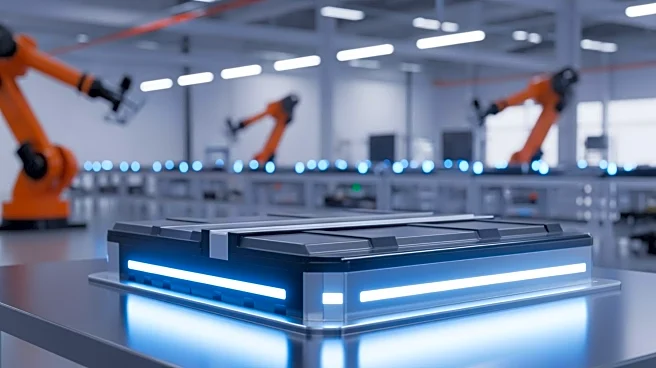What's Happening?
Toyota Motor Corp. has announced a significant investment of $10 billion in its U.S. operations over the next five years, aimed at supporting mobility efforts. This investment includes the commencement of production at its electric vehicle battery plant
in Liberty, North Carolina, which is the company's first and only such facility outside Japan. The Liberty factory, spanning 7 million square feet, is expected to produce 30 gigawatt hours of batteries annually at full capacity and create up to 5,100 jobs. The facility will serve as a hub for developing and producing lithium-ion batteries for Toyota's expanding EV portfolio, including hybrid, battery-powered, and plug-in hybrid electric vehicles.
Why It's Important?
This investment underscores Toyota's commitment to electrification and its strategic focus on the U.S. market. By enhancing its battery production capabilities, Toyota is positioning itself as a leader in the transition to electric vehicles, which is crucial for achieving carbon neutrality by 2050. The creation of thousands of jobs in North Carolina will have a positive economic impact on the region, boosting local employment and supporting community development. Additionally, Toyota's investment in STEM education programs further demonstrates its dedication to fostering innovation and preparing the workforce for future technological advancements.
What's Next?
Toyota plans to expand its production lines at the Liberty plant by 2030, which will further increase its capacity to produce batteries for a wider range of electric vehicles. The company is also expected to continue its efforts to improve the energy density of its lithium-ion batteries, enhancing the performance and efficiency of its EVs. As Toyota ramps up its electrification strategy, other automakers may follow suit, potentially leading to increased competition and innovation in the EV market.
Beyond the Headlines
Toyota's investment in the U.S. not only strengthens its market position but also reflects broader industry trends towards sustainability and clean energy. The company's focus on electrification aligns with global efforts to reduce carbon emissions and combat climate change. Moreover, the development of advanced battery technologies could have long-term implications for energy storage solutions beyond the automotive sector, potentially influencing renewable energy integration and grid stability.

















